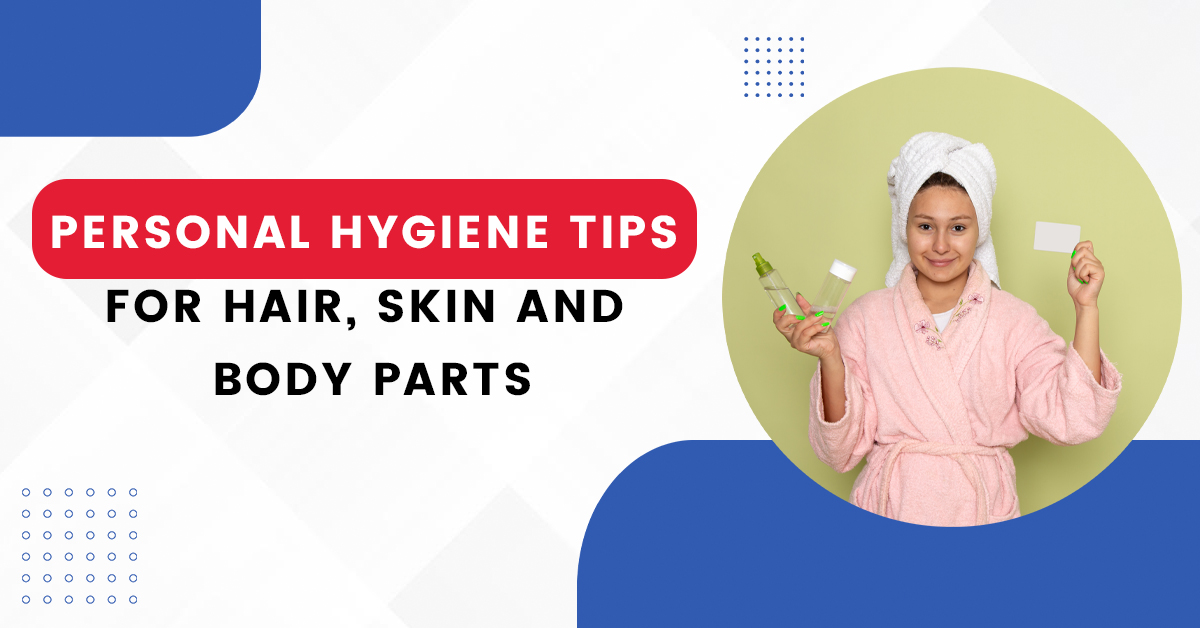What is Personal Hygiene?
You look after your body by maintaining your cleanliness is known as personal hygiene. You will need to take a shower, wash your hands, brush your teeth, and do other activities as part of this routine.
You come into contact with millions of external viruses and bacteria every day. They may stay on your body for a while and occasionally could even make you feel ill. Keeping yourself and those around you clean can help you and them from getting sick. They may also enhance your self-confidence in terms of appearance.
Hands Hygiene:
Your mouth, nose, eyes, and ears are all easy entry points for germs on your hands into your body.
When handling food, before eating, handling rubbish, sneezing, or whenever you come into contact with an animal, wash your hands.
Similarly, wash your hands after changing a baby’s diaper, assist someone with personal hygiene, or treat a wound or cut.
Hair Hygiene:
The importance of maintaining clean hair is more social than health-related. Unkempt, dirty hair can be offensive to the eye and may even start to smell.
This is frequently caused by a buildup of sebaceous gland oil on the scalp. This accumulation is fed on by bacteria, which produces odours. Leaving this buildup of oil on the hair can cause it to become greasy and weighted down. Additionally, it may lead to a flaky scalp, which can be brought on by either too much or not enough oil.
Dandruff frequently appears as a result of a dry scalp, and it can look unsightly because it can be seen throughout the hair and fall onto garments.
One must clean their hair, usually with shampoo, to prevent it from becoming oily or unclean. It’s not always necessary to shampoo every day; some people only need to do it every other day or once a week.
Depending on how quickly a person’s hair tends to get oily or dirty, they should shampoo more frequently. Since the natural oils in tightly curled hair move more slowly through the hair shaft, shampooing should only be done once per week. In situations like this, regularly washing your hair might make it too dry since it removes the oils from your hair too rapidly.
Body Hygiene:
The average person’s body has several million sweat glands. A scent, or body odour, is produced when bacteria degrade sweat.
Washing the body will get rid of the bacteria that make you smell bad and avoid skin irritation. Hair washing eliminates grease and keeps one looking clean and young.
To keep the entire body free of grime, perspiration, and any other potentially dangerous elements waiting to enter the body, it is necessary to regularly shower or bathe.
Another reason why washing is necessary is that it helps the skin shed its dead cells. The body becomes a haven for bacterial development if it is not kept clean. This growth may cause an infection or unpleasant body odour. A daily or every other day bath should be ideal for most people. The number of times a person takes a bath relies on a variety of variables, like how much they perspire, for instance.
The groyne, underarms, and face are the areas of the body that take the greatest care to keep clean. Typically, soaps and shower gels are used to wash the body because they adhere to dirt, dead skin cells, and oils before rinsing away. Take warm showers rather than ones that are extremely hot to avoid drying out your skin, and don’t stay in the water for too long. Another way to keep skin from being too dry is to apply lotion or skin moisturiser to damp skin.
Skin Hygiene:
The skin is crucial to the body’s ability to function properly. on your skin:
- safeguards the internal organs and tissue of your body
- permits you to feel (touch, pain, itching)
- facilitates the body’s absorption of vitamin D, which is necessary for strong, healthy bones.
- performs as a filter for your body. Your body’s “armour” is made of your skin. It prevents germs and bacteria from entering your body through the skin.
- Regulates body temperature. You perspire (sweat) when it’s hot outside because of the pores in your skin. A person’s body cools down as sweat evaporates. To block out the cold, your skin tightens (contracts) and develops “goosebumps.”
Nails Hygiene:
Fingernails may contain debris and pathogens, which helps bacteria spread. Keeping your nails short can help lower your risk of contracting an infection since dirt and germs can accumulate more easily under longer nails.
You likely don’t realise how unsanitary long nails can be or how they can interfere with living a healthy lifestyle. All the dirt and germs that accumulate in long nails are incredibly unhealthy and damaging to you.
Regular nail trimming is a piece of crucial personal hygiene advice for maintaining cleanliness as well as protecting your nails from hangnails, breaking, and other potential harm. Even if you enjoy having long nails, make sure to regularly trim them and remove any accumulated filth.
Ways to Have Good Hygiene:
Here are a few quick tips for maintaining proper hygiene:
- Every day, brush your teeth twice. It’s simpler to establish a pattern if you do it first thing in the morning and last thing at night. Remember: Even if you’re pressed for time, you may still brush for 2 minutes to get a thorough clean.
- Every day, wash your body. All you need is a brief wash or shower as long as you take care of the essentials. If water is scarce, cleanse your genitalia, the area around your anus, under your arms, in any skin folds, and beneath your breasts using a damp cloth or sponge.
- Regularly wash your linens and clothes. Either hand or machine washing should be done once a week. Clothing that needs to be worn again can be quickly washed in the sink and left to air dry the following day. You can put off cleaning your linens and clothes by keeping your body clean.
- Wash your hands often. If COVID-19 has taught us anything, it is that washing our hands regularly is one of the best ways to stay healthy and stop the spread of the disease. To protect yourself and other people, always wash your hands before and after touching shared, possibly contaminated, or unclean surfaces.
- After using the restroom, wipe your hands thoroughly. After using the restroom, properly wiping your hands will keep your underwear fresh and odours away. To prevent urinary infections, always wipe from front to back to keep bacteria out of the urethra. A bidet or body wipes also work. Consider using toilet paper help if you have trouble wiping due to discomfort or a disability.
- Wash your hair at least every 3 days. Most people don’t require more frequent shampooing than once a day. Depending on how sweaty you are, how much product you use, and how greasy or dry your hair is, you should wash your hair more frequently. For the majority of people, every 2 to 3 days is sufficient, but feel free to experiment by extending the interval between washes.
Effects of Poor Personal Hygiene:
Your external appearance is impacted by poor hygiene. Lack of personal hygiene is shown by stained clothing, ungroomed hair, long, unclean nails, and oily, spotty skin.
Poor hygiene is frequently linked to offensive body odour, bad breath, and obvious evidence of filth. Rashes, oily skin, and other treatable or preventable cosmetic issues may also be viewed by some as indicators of insufficient hygiene.
As a result of poor hygiene, the following potential effects may occur.
Depleted Mental Health
There are two ways that poor hygiene affects mental health. First, being dirty might make you feel alone in both your professional and social life. This isolation can impair your mental health and induce persistent sadness or social anxiety since it might make you feel inadequate and alone.
The growth of poor hygiene and mental health concerns can sometimes be stopped. Depression might cause people to stop caring about their hygiene. In some situations, a mental condition is the root reason, not the lack of hygiene.
Increased Health Risks
The risk of illness or disease can rise as a result of poor hygiene. These are illnesses that result from poor personal hygiene rather than illnesses that people normally contract by accident.
Poor bathing habits, wearing unclean clothing, and failing to wash your hands before handling food are all risk factors for many diseases that affect the gastrointestinal system and skin surface. The CDC lists parasitic fungal infections that persist in or on your body until they are treated among the ailments connected to poor hygiene.
Lack of Self-Esteem
Physical attractiveness and self-esteem are intimately related. How you care for your body and look is intimately tied to your self-image. Your self-esteem will probably suffer if people avoid you at work or in social situations due to poor hygiene.
This can result in a downward spiral of low self-esteem, a disregard for personal hygiene, and an increase in avoidance and isolation.
Poor Physical Appearance
Improper physical appearance might result from poor hygiene. A poor bathing routine can occasionally result in skin problems or hair loss. If you can discover a good skin or hair prescription, you can fix these physical appearance issues.
Such procedures could eventually be incorporated into your daily hygiene routine. By tailoring your routine in this way, you make sure to practise fundamental hygiene procedures as well as address particular difficulties required for greater mental and physical health
Read More:- Common Summer illnesses Problems


